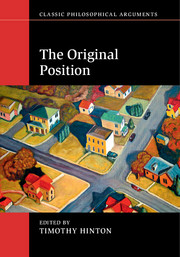Book contents
- Frontmatter
- Contents
- List of contributors
- Acknowledgments
- List of abbreviations
- Introduction: the original position and The Original Position – an overview
- 1 Justice as fairness, utilitarianism, and mixed conceptions
- 2 Rational choice and the original position: the (many) models of Rawls and Harsanyi
- 3 The strains of commitment
- 4 Our talents, our histories, ourselves: Nozick on the original position argument
- 5 Rawls and Dworkin on hypothetical reasoning
- 6 Feminist receptions of the original position
- 7 G. A. Cohen's critique of the original position
- 8 Liberals, radicals, and the original position
- 9 The original position and Scanlon's contractualism
- 10 The “Kantian roots” of the original position
- 11 Stability and the original position from Theory to Political Liberalism
- 12 The original position in The Law of Peoples
- References
- Index
6 - Feminist receptions of the original position
Published online by Cambridge University Press: 05 December 2015
- Frontmatter
- Contents
- List of contributors
- Acknowledgments
- List of abbreviations
- Introduction: the original position and The Original Position – an overview
- 1 Justice as fairness, utilitarianism, and mixed conceptions
- 2 Rational choice and the original position: the (many) models of Rawls and Harsanyi
- 3 The strains of commitment
- 4 Our talents, our histories, ourselves: Nozick on the original position argument
- 5 Rawls and Dworkin on hypothetical reasoning
- 6 Feminist receptions of the original position
- 7 G. A. Cohen's critique of the original position
- 8 Liberals, radicals, and the original position
- 9 The original position and Scanlon's contractualism
- 10 The “Kantian roots” of the original position
- 11 Stability and the original position from Theory to Political Liberalism
- 12 The original position in The Law of Peoples
- References
- Index
Summary
Introduction
Does the original position accommodate feminist considered convictions? What I mean by this is: does the original position allow us to identify as unjust the arrangements that feminist considered convictions highlight? An answer to this question will be of interest to those wondering about the feminist content of Rawlsian liberalism. The question may also be understood as a step in exploring the possibility of a feminist liberalism that is contractualist.
To answer this question, we need a list of feminist considered convictions, which I provide below. I show that much of what the feminist considered convictions identify as injustice is recognized as such by the original position; but much of it is not. I show also that the original position underwrites necessary effective coercive remedies for some of the injustices it recognizes, but not for all of them. So, I argue, we must say that some injustices recognized by the original position may endure in a Rawlsian well-ordered society. I then explore a feminist use of the original position associated with the work of Susan Okin that captures more of what feminists identify as injustice; but, I argue, this approach fails to fully accommodate feminist considered convictions about dependency. I ask whether an initial situation could be designed that accommodates feminist considered convictions about dependency and is also part of a liberal view.
The chapter follows the process of reflective equilibrium, which Rawls tells us goes on “indefinitely” (PL, p. 97). I begin by pointing out a discrepancy between a set of considered convictions on the one hand and Rawls's favored interpretation of the initial situation, the original position, on the other. In the face of this discrepancy one might opt to modify the feminist considered convictions; I show how the original position facilitates such modification. Alternatively, one might opt to modify the original position; I explore some modifications that feminists have suggested. If feminist liberalism is basically contractualist, the truth of the feminist considered convictions may not be assumed but must be established, perhaps through a process of reflective equilibrium. This chapter presents some first steps in that process.
Feminist considered convictions
The list of feminist considered convictions I offer here is culled from the family of social movements and doctrines that is feminism.
- Type
- Chapter
- Information
- The Original Position , pp. 119 - 138Publisher: Cambridge University PressPrint publication year: 2015

